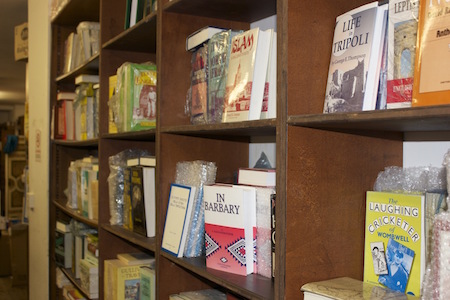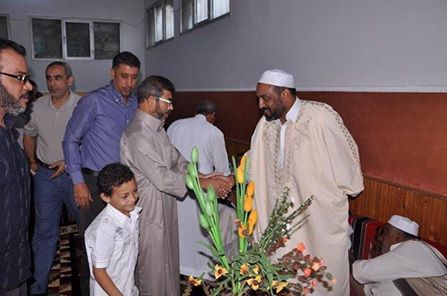By Sherif Dhaimish.

Tripoli, 13 December 2014:
In 1952, Ghassan Fergiani’s father, Mohamed, established his first bookshop in Tripoli. 25 years later, he . . .[restrict]would be confronted by the regime and driven out of his homeland and into the basement office at a Hampstead bookshop, where his passion for literature would continue to blossom.
Mohamed Fergiani and his family moved from Ghariyan to Tripoli in 1928. Upon arrival, they moved into a house with four other families, each with their own room. At age five, Mohamed was introduced to the literary world whilst playing outside his home in the city’s then newly built up Dahra district.
“A nicely dressed young boy walked by with a book in his hand,” Ghassan says. “My father asked him, ‘What is that?’ ‘È libro’, the young boy replied in Italian (It’s a book). He really liked the coloured pictures and text. After discovering it was from a school, my father got it in his head that he wanted to go. After weeks of screaming ‘Scuola! Scuola!’ (Italian for school) to his parents they managed to secure him a place.”
Ghassan’s distinct recollection of the story points to the encounter’s significance not only to his father, but to himself also. “He stayed in school for about six years where he studied Arabic and Italian. At that time, six years was enough. He discovered his business mind, which enabled him to set up the bookshop and later move into real estate.”
Dar el-Fergiani publishing house was born. Mohamed would use basic methods to print the works of Libyan authors by travelling back and forth to Egypt. “It wasn’t sophisticated, but that’s how he started,” Ghassan adds. His father also provided newspapers, magazines and literature to Tripoli’s international community including Arab, British, American, German, Pakistani and Bangladeshi workers. Anglophone readers would choose their reads from the Fergiani’s English bookshop’s eclectic selection.
The problems began after the 1969 coup d’etat fronted by Muammar Qaddafi. Mohamed was banned from publishing; the only books to be read were those penned by the dictator himself. Around 1977, Qaddafi was sidelining politicians, unions, businessmen and students. The gap was closing in on Mohamed so he followed his father’s advice to leave the country.
In 1980, he arrived in London. “He loved the city because of its tolerance. You can live your life and nobody bothers you.” London’s cultural prominence allowed Mohamed to further explore his love for Orientalist books. He would search antiquarian bookshops for titles that focused on Libya and the wider region. Darf Publishers was then established as the English branch of Dar el-Fergiani.
The publishing house sports an outstanding array of books on North Africa and the Middle East, most of which were written between the 18th and 20th century. Around 200 books of this genre were published in the 1980s. Sadly, Mohamed passed away in 2011. His son Ghassan continues to carry the torch for Darf, which now focuses on translating titles for English audiences, whilst his brothers continued with the business in Tripoli and Cairo.
This year, Darf released three new titles including Mansour Bushnaf’s Chewing Gum; a tale of romance, but more so an existential observation of Libyan society under dictatorship. Maps of the Soul by Ahmed Fagih contains three stories about 1930s Libya under Italian rule with nine more to follow in succeeding volumes. The most recent release is African Titanics by Eritrean writer Abu Bakr Khaal. It tells the story of a young man’s struggle to reach European shores from Eritrea; a satirical voyage filled with desperation, friendship and perseverance. Next year, Alessandro Spina’s collection of novels entitled The Confines of the Shadows will be released, consisting of three novels – The Young Maronite (1964), Omar’s Wedding’(1970) and The Nocturnal Visitor (1972). In 2006, Spina’s epic was released in Italy, and later earned him the prestigious Premio Bagutta award. The 1,250-page omnibus is considered as a significant chronology of 20th century Benghazi.
“This book goes back to my father. Charis Bredin, who translated African Titanics introduced me to Andre Nafis-Sahely who is translating the Italian original into English. We also have the rights for the Arabic version, which we intend to publish.”
Ghassan’s inherited passion continues to drive Darf Publishers, and open doors for new readers whilst nurturing the mind of the more literary savvy crowd. Future projects illuminate the new ambitions of Darf, introducing authors and audiences who would have never otherwise met. [/restrict]










